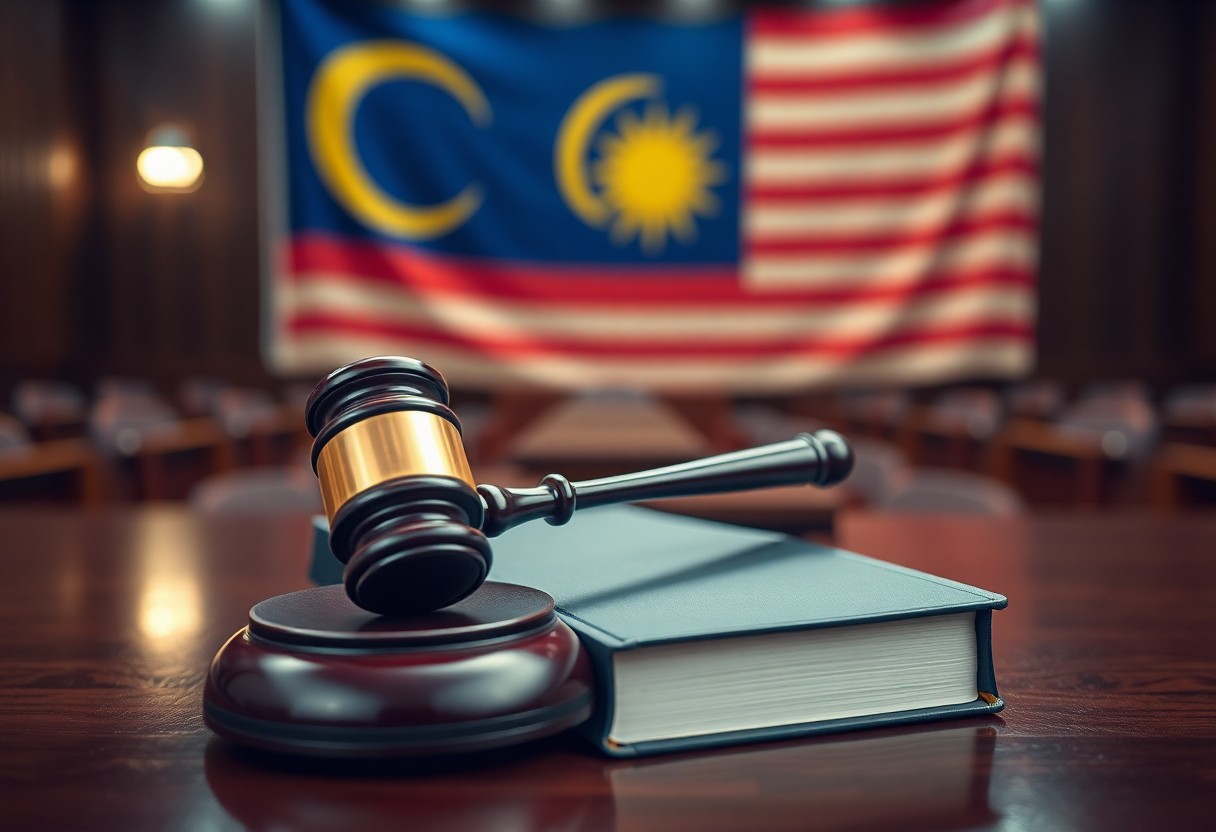With an understanding of Malaysian law, you should be aware that defamation can have serious legal consequences. If you have been accused of defamation or are a victim seeking justice, knowing the potential penalties is vital. Malaysian law classifies defamation into libel and slander, each carrying its own implications. The penalties can range from financial compensation to possible imprisonment, depending on the severity of the case. In this post, we will explore the legal framework surrounding defamation and the repercussions you may face.

Key Takeaways:
- The penalty for defamation in Malaysia can include both civil and criminal implications.
- Civil defamation claims may result in damages awarded to the victim, which can include compensatory and punitive damages.
- Criminal defamation in Malaysia can lead to fines or imprisonment, with penalties depending on the severity of the offense.
- The Defamation Act 1957 governs civil defamation in Malaysia, outlining the framework for legal recourse.
- Defendants can utilize defenses such as truth, fair comment, and absolute or qualified privilege in defamation cases.
- The burden of proof typically rests with the plaintiff to demonstrate that the statement is defamatory, false, and made with malice.
- The statute of limitations for filing a civil defamation suit in Malaysia is generally one year from the date of publication of the defamatory statement.

Understanding Defamation in Malaysian Law
The concept of defamation under Malaysian law refers to the act of making false statements that harm an individual’s reputation. Defamation can occur in various forms, whether spoken or written, and can lead to serious legal repercussions for the offender. In Malaysia, the legal framework surrounding defamation aims to balance the right to freedom of expression with the protection of a person’s reputation.
Definition of Defamation
The term “defamation” encompasses statements that are damaging, untrue, and presented as facts about an individual or entity. In Malaysia, defamation laws provide recourse for victims who seek justice against false allegations that could tarnish their public image. It is crucial to prove that the statement was published or disseminated and that it caused harm to the affected party.
Types of Defamation
The different types of defamation recognized in Malaysian law include:
- Libel: Written defamation, such as articles or social media posts.
- Slander: Spoken defamation, such as verbal allegations during conversations.
- Defamation per se: Statements that are inherently damaging without needing to show actual harm.
- Defamation per quod: Statements that require additional facts to establish harm.
- Publishing: Sharing defamatory content in various forms, including online platforms.
Recognizing the nuances of these types is vital for understanding your rights and responsibilities regarding defamation claims.
| Type of Defamation | Description |
| Libel | Written defamatory statements. |
| Slander | Verbal defamatory statements. |
| Defamation per se | Inherently damaging statements. |
| Defamation per quod | Context-dependent statements requiring proof of harm. |
| Publishing | Dissemination of defamatory statements. |
Even outside the legal definitions, understanding the implications of defamation is important in today’s digital age. You must be aware that sharing or making comments could lead to serious legal battles if proven defamatory. A thorough awareness of your rights and the types of defamation can help protect your reputation while safeguarding others. Recognizing these aspects can empower you to navigate social interactions responsibly and avoid potential conflicts.

Legal Framework Governing Defamation
Some aspects of the legal framework governing defamation in Malaysia are governed primarily by the Defamation Act 1957, which outlines the definition, types, and liabilities associated with defamation. It differentiates between libel (written statements) and slander (spoken statements) and provides a structure for you to understand how defamation claims can be pursued. Additionally, case laws and precedents play a significant role in influencing the interpretation and enforcement of defamation laws in Malaysia.
Relevant Malaysian Laws
After the Defamation Act 1957, other relevant provisions include the Evidence Act 1950, which outlines the admissibility of evidence in defamation cases, and the Penal Code, which includes certain offenses related to defamation. Understanding these laws helps you navigate potential legal issues if you find yourself involved in a defamation claim.
Case Law and Precedents
Around the Malaysian legal landscape, case law and precedents have significantly shaped the understanding and enforcement of defamation law. Landmark cases often set the tone for future rulings, providing guidance on the nuances of free speech versus reputation protection.
Plus, you should be aware that precedent cases can influence your situation significantly. For instance, cases like Yang Wang v. Lim Koon Keng illuminate how courts balance the right to freedom of expression with a person’s right to reputation. These precedents elaborate on what is considered defamatory, the defenses available to the accused, and the potential damages awarded. Your understanding of these important legal decisions can empower you to assess whether a statement could result in a defamation claim.
Penalties for Defamation
Your understanding of defamation under Malaysian law includes recognizing the significant penalties that can arise from making false statements that harm another’s reputation. For further insights, check out A brief overview of the law of defamation in the UK and …. It is important to be aware of these potential consequences to navigate your communications wisely.
Civil Penalties
The penalties for civil defamation can include compensatory damages, which may cover both actual damages and loss of reputation, leading to substantial financial repercussions for the defamer.
Criminal Penalties
One aspect of defamation that you should consider is the potential for criminal penalties, which may apply in specific cases under Malaysian law.
Consequently, engaging in defamatory acts can lead to imprisonment for up to two years or fines, depending on the severity of the offense. This legal landscape emphasizes the necessity of ensuring the accuracy of any statements you make regarding others, as the consequences can be both damaging and profound, impacting your future and personal freedom.
Defenses Against Defamation Claims
Once again, you should be aware that there are various defenses available if you are facing a defamation claim. Understanding these defenses can aid in protecting your reputation and minimizing potential legal consequences. Engaging with the relevant legal provisions in Malaysian law can help you navigate and assert your rights effectively.
Truth as a Defense
The most solid defense against a defamation claim is the assertion of truth. If you can demonstrate that the statements made are factual, you are generally not liable for defamation. This principle emphasizes the importance of ensuring that your statements are based on accurate information before speaking or publishing them.
Qualified Privilege
Above all, another defense you may consider is qualified privilege. This legal protection applies in situations where you are sharing information and have a legitimate interest, or where the disclosure is in the public interest, provided you do not act with malice.
Hence, to successfully claim qualified privilege, you need to show that the information disseminated was relevant and necessary for the context in which it was shared. This applies, for example, in reports made to authorities or comments given in a truly unbiased forum. As long as your intentions are legitimate and you avoid any malicious intent, you may protect yourself under this defense. However, should the court find evidence of malice, you could become liable for defamation, reinforcing the need for caution in such matters.
The Role of Intent in Defamation Cases
Many factors influence defamation cases, but intent plays a significant role. In Malaysian law, your intent can determine whether your statements are deemed malicious or merely negligent. This distinction is vital as it affects the outcome of your case. If you acted with intent to harm, it could lead to a more severe penalty, while negligent statements may incur lesser consequences.
Malice and Negligence
With intent categorized as either malice or negligence, your demeanor during the incident can greatly influence your liability. Malice refers to a deliberate intention to defame, while negligence suggests a failure to exercise due care in making statements. Each carries different implications for your legal standing.
Impact on Penalties
By understanding the impact of intent on penalties, you can better assess your legal risks in defamation cases. Your actions may be scrutinized for severity, influencing the court’s decision on penalties imposed against you.
Penalties for defamation under Malaysian law vary significantly based on the intent shown in your case. If the court finds you acted with malice, you can expect more severe consequences, including higher damages. Conversely, if your actions were deemed negligent, penalties may be less drastic but still impactful. Establishing intent clearly affects not just the judicial outcome but also your reputation and future communications. Understanding these nuances can guide you in managing your statements and potential liabilities moving forward.
Summing up
Now that you understand the penalties for defamation under Malaysian law, it’s important to recognize that defamation can lead to significant legal consequences, including fines and potential imprisonment. If you find yourself involved in a defamation case, you must be aware of your rights and obligations. Engaging a legal expert will help you navigate the complexities of the law and ensure that you are adequately protected. Your actions and statements can greatly impact your reputation, so proceed with caution and informed awareness.
FAQ
Q: What is defamation under Malaysian law?
A: Defamation in Malaysia refers to the communication of false statements about a person that can harm their reputation. It can be classified into two categories: libel (written statements) and slander (spoken statements). Under Malaysian law, defamation is addressed in the Defamation Act 1957, which outlines the legal framework for such cases.
Q: What are the elements required to prove defamation in Malaysia?
A: To establish a case for defamation in Malaysia, the plaintiff must prove three key elements: first, the statement made must be defamatory in nature; second, the statement refers to the plaintiff; and third, the statement must be published to a third party. Additionally, the plaintiff must show that the statement is false and has resulted in damage to their reputation.
Q: What are the potential penalties for defamation in Malaysia?
A: If a defendant is found liable for defamation, they may face several penalties. These can include monetary damages awarded to the plaintiff for loss of reputation, emotional distress, and potential legal costs. In certain cases, the court may also issue an injunction to prevent further defamatory statements. Criminal defamation can also attract fines in specific circumstances, although this is less common.
Q: How does one defend against defamation claims in Malaysia?
A: Defendants in defamation cases can use several defenses, including truth (justification), fair comment, and absolute or qualified privilege. If a defendant can prove that the statement is true or was made in good faith without malice, they may avoid liability. Fair comment is also applicable when the statement is an opinion on a matter of public interest.
Q: What should a person do if they believe they have been defamed in Malaysia?
A: If someone believes they have been defamed, they should first gather evidence, such as screenshots, recordings, or witness statements. It is advisable to seek legal counsel to understand the options available, which may include sending a letter of demand to the defamer, seeking a retraction, or filing a legal case. Prompt action is crucial to preserve rights and potential remedies.
Q: Are there time limits for filing a defamation claim in Malaysia?
A: Yes, under Malaysian law, there is a time limit for filing a defamation claim. The limitation period is typically one year from the date of publication of the defamatory statement. It is important for individuals to act within this timeframe to ensure that their claim is considered valid in court.
Q: Can social media posts lead to defamation claims in Malaysia?
A: Yes, defamatory statements made on social media can lead to defamation claims under Malaysian law, as social media is considered a public forum. Individuals can be held liable for posts that harm another person’s reputation. It is crucial to be cautious about the content shared online to avoid potential legal consequences.
